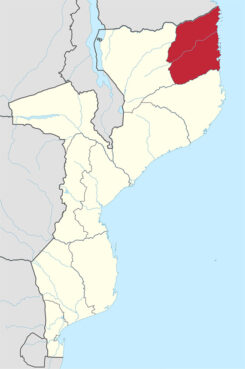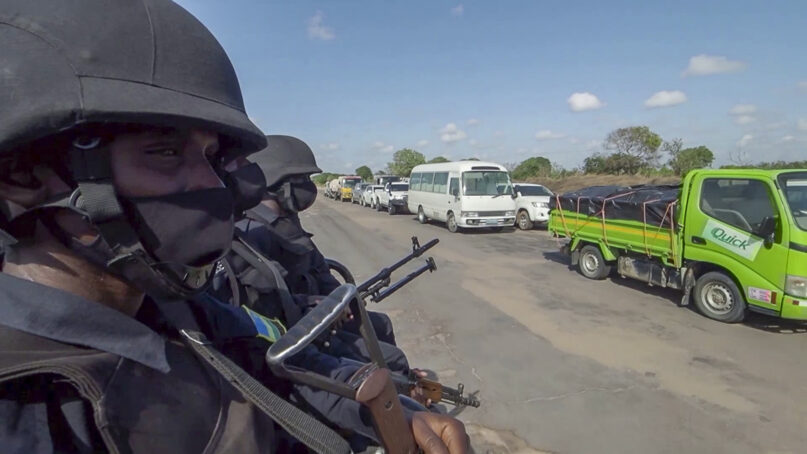MAPUTO, Mozambique (RNS) — In the remote villages of Mozambique’s Cabo Delgado province, fear seems constant. Families say they no longer sleep through the night, children jump at the sound of footsteps and parents clutch their little ones close, terrified they might be the next to disappear.
The jihadist insurgency that has gripped the country’s northernmost province since 2017 has entered a new phase targeting children, human rights organizations have warned. Cabo Delgado, a coastal province that borders Tanzania and lies along the Indian Ocean, is rich in natural gas reserves but has been wracked by violence from insurgents associated with the Islamic State group, leaving thousands dead and about a million people displaced.
Faith leaders and aid groups say child abductions are rising, and children are being taken from their homes or schools. Some who are abducted are forced to work for armed groups, while others are married off. According to Human Rights Watch, at least 120 children were kidnapped since the beginning of the year.
Most of the kidnapped children are found after escaping or being abandoned by fighters. Villagers often bring them to churches, which have become safe hubs for finding the children’s relatives with the help of local authorities and aid agencies. Militants release children mainly when they are too weak to travel or during military raids.

The Cabo Delgado province, red, in northern Mozambique. (Image courtesy of Wikimedia/Creative Commons)
Pentecostal Pastor Thomas Machava, who coordinates a network of congregations in Chiure district, said his churches are stretched thin but won’t turn anyone away.
“When a child comes back, they are often sick, malnourished and terrified,” he said in a phone interview. “We take them in, we feed them, we pray with them, and we help them find their families. Some children do not talk for days. Others cry all night. We need trained counselors and safe spaces, but we do what we can with what little we have.”
Machava said his congregations have become advocates, pressing local authorities and international donors to prioritize child protection. “We believe that God has not abandoned us, but sometimes we fear the world has,” he said. “These children are our future. If we lose them to fear, to violence, to despair — we lose everything.”
For survivors like 12-year-old Amina, who now lives in a displacement camp outside the Metuge district, the memories of abduction are never far away, she said. She is being identified by her first name only due to concerns for her safety.
Amina was abducted in March 2023 in Ancuabe district and held for about five days before being released near Macomia. Locals believe militants let her go because she was too young to travel with them.
“They came when I was fetching water,” she said softly in a recent phone interview. “I heard shouting, then everything was chaos. I thought I was going to die. When they let me go, I did not know if I was happy or scared to be back home.”
Amina and her family are Catholic. After her release, parish volunteers helped reunite her with her mother and connected them to Caritas, a Catholic relief network, for assistance.
Cabo Delgado is home to one of Africa’s largest natural gas projects, attracting billions of dollars in foreign investment. But local communities have long said they have seen little benefit from the resource boom. Many lost land to development projects and remain without jobs, electricity or adequate schools and clinics.

In this image made from video, Rwandan police patrol a road in Palma, Cabo Delgado province, Mozambique, Aug. 15, 2021. (AP Photo/Marc Hoogsteyns)
This frustration has fed into a violent insurgency led by armed groups known as al-Shabab — not directly linked to the Somali group of the same name but sharing an Islamist ideology. In 2019, the militants pledged allegiance to the Islamic State group, which later claimed responsibility for a series of high-profile attacks.
The fighters, many of them young men from marginalized communities, accuse the government of corruption and exclusion. Analysts say the conflict has since become a complex mix of ideology, economic grievances and criminal activity, with attackers targeting civilians, looting villages and recruiting children to swell their ranks.
In an Aug. 8 report to the Catholic pontifical international charity foundation, Aid to the Church in Need, Kwiriwi Fonseca, a priest in the Diocese of Pemba, which covers Cabo Delgado, warned that the humanitarian crisis is often forgotten by the wider world.
“This silence bothers us, at a time when thousands upon thousands of our brothers in Cabo Delgado, especially in the region of Chiure, have seen the crisis aggravated by new attacks, their homes burned, their children taken from them,” he said in the report.
With government services overwhelmed and aid slow to reach remote areas, churches have become critical sources of first responders. Parish halls have been turned into emergency shelters, and pastors and priests have organized food distributions and trauma counseling.
Isabel Machado, a 36-year-old mother currently in a displacement camp near the city of Montepuez, saw her 10-year-old son disappear.
“They took him last year,” she said. “He was helping his father herd goats. We heard gunfire, then silence. My husband never came back either. Every day, I wait for someone to tell me they have found him.”
Machado said she now sends her two remaining children to a church-run day center where volunteers watch over them. “I cannot lose another child,” she said. “Even if I have no food, I will keep them close.”
Faith leaders are urging the Mozambican government and international partners to strengthen child protection measures, increase funding for mental health services and create safe corridors for families returning home.
“Peace is not just the silence of guns,” Machava said. “Peace is a child going to school without fear. It is a mother sleeping through the night. It is a father not wondering if his daughter will be taken tomorrow.”
However, hope endures. Evening prayers echo across displacement camps, and children gather under tarps and mango trees to attend makeshift classes. Volunteers organize games and lessons to bring back a brief sense of normalcy.
Amina said she dreams of becoming a teacher one day. “I want to teach children so they are not afraid,” she said. “I want them to laugh again. I want to laugh again.”



